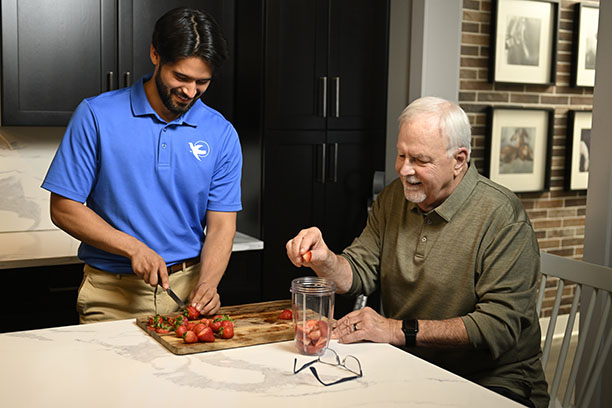
Caring For Someone with Alzheimer's in Alexandria, VA
According to the Alzheimer’s Foundation of America, as many as 5.1 million Americans may have Alzheimer’s disease, a fatal brain disease that causes a slow decline in memory, thinking and reasoning skills. A diagnosis of Alzheimer’s disease can be frightening and devastating to an individual and their loved ones, but there are some steps you can take to make it through.
While there is no cure for Alzheimer’s, there are treatments and therapies that can slow the worsening of dementia symptoms and improve the quality of life for those with the disease and their caregivers. If you suspect your loved one is showing symptoms of Alzheimer’s, it is extremely important to be proactive by getting them to their physician, and if a diagnosis is made, to get a care team and plan in place as soon as possible.
10 Warning Signs of Alzheimer’s
- Memory loss that disrupts daily life: not remembering recent events, names, where things go, and other new information.
- Challenges in planning or solving problems: Having trouble following a familiar recipe or keeping track of monthly bills, difficulty concentrating and taking much longer to do things than previously should be taken seriously.
- Difficulty completing familiar tasks at home or at work.
- Confusion about time and place: People with Alzheimer’s can lose track of dates, seasons and the passage of time.
- Trouble understanding visual images and spatial relationships: look for difficulty reading, judging distance and determining color or contrast.
- New problems with words in speaking or writing: Signs include trouble finding the appropriate words, completing sentences, and following directions and conversations.
- Misplacing things and losing the ability to retrace steps: People with Alzheimer’s may put things in unusual places, or accuse others of stealing.
- Decreased or poor judgment when making decisions: There may be issues with monetary scams or less attention to grooming and hygiene.
- Withdrawal from work or social activities.
- Changes in mood or personality: Signs include increased depression, fearfulness, anxiety or suspicion, rapid and persistent mood swings, withdrawal and disinterest in usual activities.
If your loved one is displaying any of these warning signs, it is vital to have them evaluated by a physician and screened for Alzheimer’s. It is important to remember that Alzheimer’s disease is not a normal part of the aging process, and it should not be mistaken for basic forgetfulness. Every person may experience one or more of these signs in different degrees, but with Alzheimer’s disease, these symptoms gradually increase and become more persistent.
Alzheimer's Support is the Most Important Resource
If a physician diagnoses Alzheimer’s, the more proactive you are in making decisions regarding caring for someone with Alzheimer's, the more you can manage the disease. Here are a few basic steps to help if you or someone you love is diagnosed with Alzheimer’s:
- Educate yourself about the disease. The more you know, the more you can be prepared. The Alzheimer’s Foundation of America and the Alzheimer’s Association are two great resources.
- Take care of financial, legal and long-term care planning issues. Discuss wishes related to future care and end-of-life issues.
- Employ cognitive stimulation. Listening to music, word puzzles and memory games can help and can provide a positive experience for the patient and caregivers.
- Arrange respite and/or regular professional care. Even if you are willing and able to be a primary caregiver for an Alzheimer’s patient, you will need help, if only to take a short break. Plus, it helps to introduce a professional caregiver while a person is still in the early stages of Alzheimer’s, because once the disease progresses, it can be more difficult and upsetting to change routines. When looking to hire home care help, try to find someone with Dementia Care Professionals of America training or experience with dementia care clients. Visiting Angels, for example, the nation’s leading network for quality, compassionate home care, is one local home care franchised agency that provides this training to its staff.
- Build a support system. Being a caregiver for someone with Alzheimer’s can be stressful and overwhelming. Find people to talk to, reach out for help, and always make time to maintain your own physical and mental health. Many local hospitals and departments of aging offer free support groups, along with sites like the National Family Caregivers Association and Caring.com.
Serving Arlington, Alexandria and the Surrounding Communities
Visiting Angels ALEXANDRIA, VA
85 S Bragg St #501Alexandria, VA 22312
Phone: 703-333-5086
Fax: 703-333-5892
